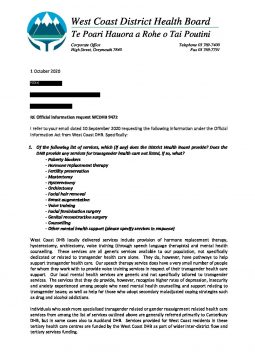RE Official information request WCDHB 9472
I refer to your email dated 10 September 2020 requesting the following information under the Official Information Act from West Coast DHB. Specifically:
1. Of the following list of services, which (if any) does the District Health Board provide? Does the DHB provide any services for transgender health care not listed, if so, what?
– Puberty blockers
– Hormone replacement therapy
– Fertility preservation
– Mastectomy
– Hysterectomy
– Orchiectomy
– Facial hair removal
– Breast augmentation
– Voice training
– Facial feminization surgery
– Genital reconstruction surgery
– Counselling
– Other mental health support (please specify services in response)
For services provided by the DHB:
2. What is their current status? What clinic (or clinics) provides the service? Are they accepting new patients?
3. Broken down by provided services (and initial consultation and readiness assessments or other if applicable), how long is the current wait time on appointments for transgender health? How long have these wait times been in previous years that the service was available?
4. What set(s) of transgender health guidelines are used to inform practice?
5. What requirements are there for patients accessing care? (Eg. Readiness assessment)
6. For HRT specifically, what is the standard practice regarding choice of medication and dosages? Are GPs expected to be able to provide HRT, and if so what support are they given to ensure quality of care? What measures are in place to ensure that all patients are fully informed of all medications that could meet their HRT needs besides the suggested treatment plan?
7. Does the DHB have a Transgender Health Key Worker (or similar)?
8. Are there any youth-specific service providers? How would an underage person access trans-specific healthcare in the DHB?
9. When were the available services first offered?
10. Have these services ever been unavailable, and if so, between what dates?
11. Are patients referred elsewhere for these services? If so, where are they referred to?
12. Were any of these services ever previously provided by the DHB?
13. Is there any additional support made for healthcare needs that are not particular to transgender health but are particular areas of interest for transgender health? Eg. Substance use, mental health care.
14. What plans are there, if any, to expand or improve care for transgender patients within the DHB?
15. Have there been any internal reviews of the care provided or outcomes for transgender patients? If so, what were the results of those reviews, and what action was taken based on them?
16. What measures does the DHB currently have in place to educate healthcare workers not working in transgender health areas on the needs of transgender patients they may encounter? How is their right to be treated with dignity upheld?
17. Have any actions been taken based on complaints by transgender patients? If so, what actions
have been made in response to complaints?

